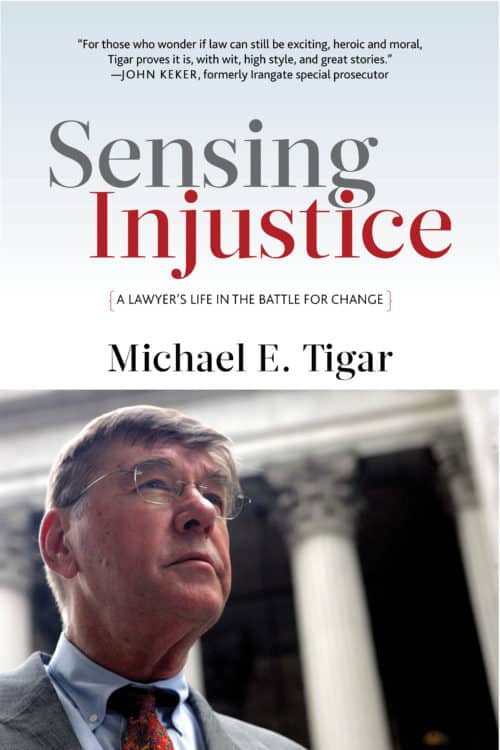Sensing Injustice:
A Lawyer’s Life in the Battle for Change
512 pages/ $29 / 978-1-58367-920-3
By Michael Tigar
Reviewed by Michael Myerson
“The book’s prologue is a snapshot of Tigar’s first argument before the US Supreme Court in 1969, three years out from Berkeley Law. The case was a challenge to the Selective Service System’s (SSS) arbitrary use of punishment — without any due process — of young people resisting being drafted into the army to fight an unjust war against Vietnam. Tigar’s successful argument was in defense of a client who mutilated his draft card and faced possible loss of deferment and immediate conscription. The court’s opinion positively affected untold thousands of draftees and indirectly the arbitrary powers of innumerable government agencies.
Not many attorneys can claim a Supreme Court victory so early in their careers, but Tigar actually arrived at the court three years behind schedule. First in his class, Tigar was appointed by Justice William Brennan as his clerk. But when the young law graduate, wife and small son in tow, drove from California to DC to report to work, he found that he was out of the job. It seems the FBI, with its sometimes-fabricated reports, together with the Johnson administration (through Justice Abe Fortas, an old wingman for LBJ) didn’t appreciate Tigar’s opposition to the war and let Brennan know that the new clerk was unacceptable in the pristine precincts of the Supreme Court.
That disappointment was unfortunate for the young Tigar family, but a welcome development for readers of this memoir, because Tigar found work as an associate in the law firm of Edward Bennett Williams, the best and most important criminal defense attorney in the nation’s capital. Tigar became a protégé, and later a partner of Williams, who, through sheer legal acumen, loyal friendship, and brilliant wit, provides the reader with some of Tigar’s best stories.
….Tigar is nothing if not erudite. To help illustrate his points, the author peppers the book with quotes from English poet John Dryden, Greek poet Heraclitus, the German writer Hans Magnus Enzensberger, George Bernard Shaw, Percy Shelley, Samuel Beckett, Lord Brougham’s defense of Queen Caroline in 1820, Berthold Brecht, and Stephen Vincent Benet, among others. What might be considered preening for another author is simply part of Tigar’s nature. It’s what happens when you’re an exceptionally bright child being raised by a single, working mom, and entertain yourself after school every day by bicycling to the library to read every available volume, memorizing any passages that strike your fancy. And then make that a lifelong daily practice, without the bike and branch library.
Lawyers and law students will find Sensing Injustice invaluable. But the rest of us who just like a good story will also benefit. Among the cast of characters making cameo appearances are scores of attorneys, judges, and justices (including Justice Brennan, who eventually became Tigar’s friend and admirer), Bill Kunstler, cowboy Roy Rogers (a family acquaintance), Simone Signoret, James Baldwin, Jeremy Corbyn, Peggy Seeger, the great Scots poet Hugh MacDiarmid, Donald Sutherland, and Otto Preminger.
Tigar only alludes to the personal costs of his drive to know more, be better prepared, and work harder than anyone else in advocating for his clients. These include failed relationships, periodic exhaustion, and a bad case of shingles. A friend of mine into his third marriage once told me he tried until he finally got it right. Happily, Tigar got it right during the years of the Nichols case. A former New York Times journalist and author, Jane Blanksteen changed careers and attended Columbia Law, which required forty hours of pro bono work. When the Alfred P. Murrah Federal Office Building blew up in Oklahoma City, she wrote Tigar to volunteer her time. Those forty hours eventually became a quarter century and counting of a law partnership and marriage to Tigar.
In his play about Chicago’s Haymarket martyrs in late nineteenth century, Tigar has anarchist Lucy Parsons telling Clarence Darrow, “We are all on trial in this life we have chosen, Clarence. All we can know is that none of us will live to see the verdict.” My guess is that Parsons (or Tigar) has it wrong. Readers of Sensing Injustice will likely render a unanimous verdict on Tigar’s lifetime of fighting the good fight on our behalf.”
To read the read the full review, you can head to Jacobin


Comments are closed.